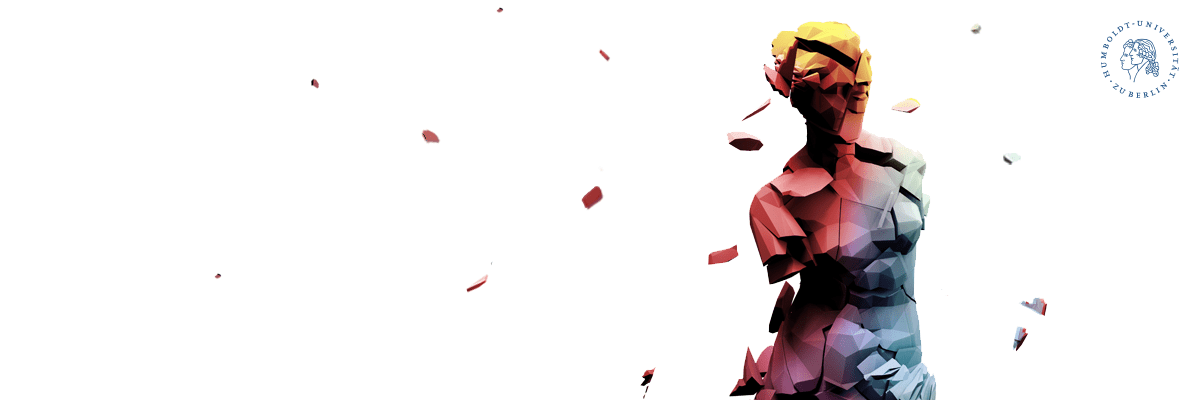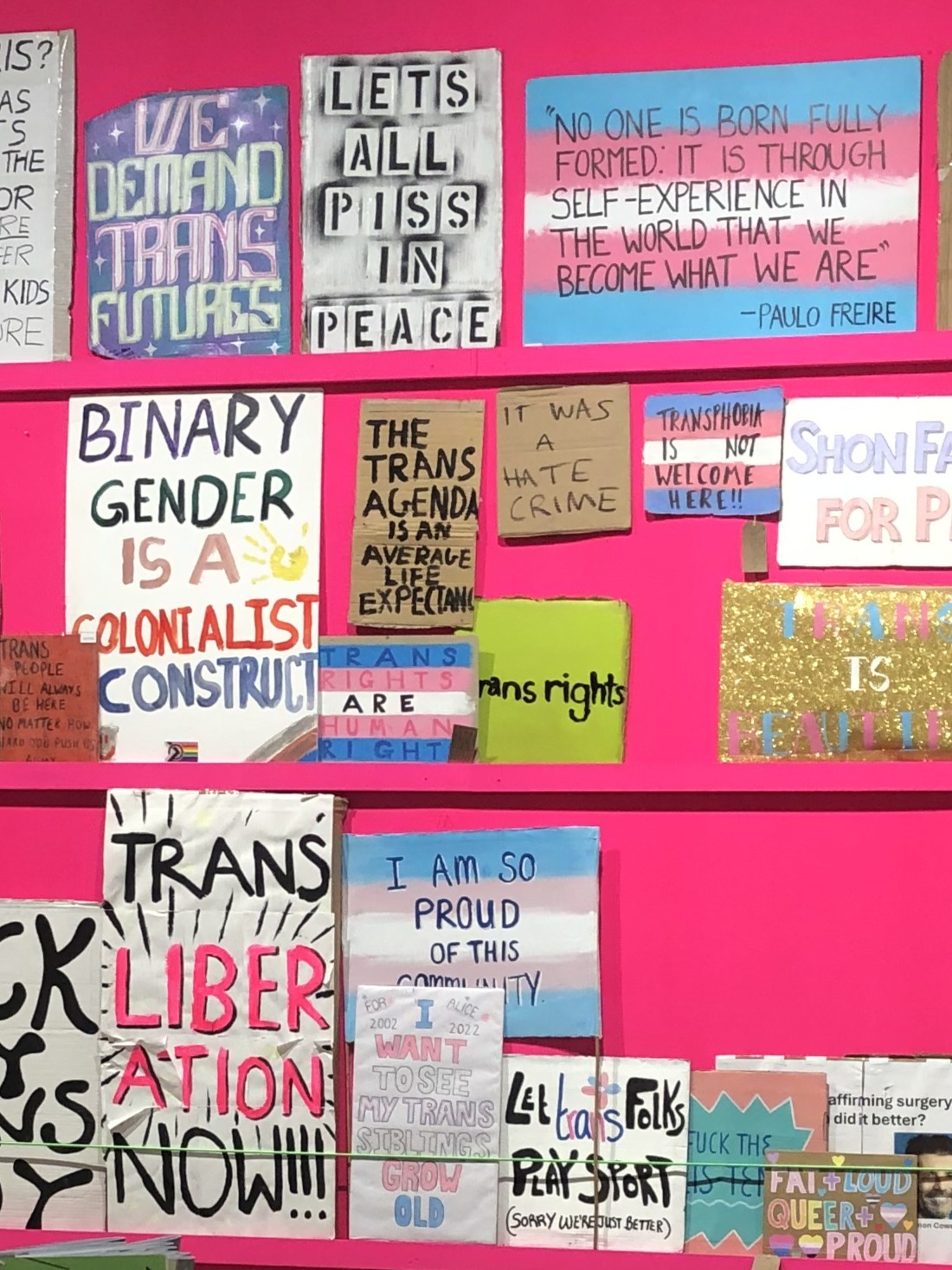Public spaces are shaped by us and, in turn, they shape us. Too often, however, they are commodified, reduced to grids and coordinates designed for control, measurement, and consumption (Lefebvre 1996). Such commodification results in spaces that can feel sterile and soulless, affecting those who enter them and imposing certain behavioral rules. Examples range from minimalist cafes where one must pay to use a laptop to once-free public areas – in Berlin, Görlitzer Park, Mauerpark, and the district of Schöneberg have been molded by gentrification, commercialization, and “park for all-ification.”
For the trans community, these shifts raise critical questions: How can we create and sustain environments that empower marginalized groups, particularly trans individuals? How do we reshape not only the spaces but also the cultural norms they generate? What do these spaces tell us about the structure of the social world?
Trans Materialism
A trans materialist perspective – Marxism-influenced trans theory – suggests we abandon the abstraction of gender identity as a private, individual experience. Trans materialists argue that this internalization is a neoliberal move that obscures the structural forces shaping gendered life. Instead, gender is seen as a politically charged, embodied experience shaped by labor, race, class, and exposure – historically produced, culturally specific, and institutionally mediated.
Kadji Amin critiques the cis/trans binary for implying only two ways of living, overlooking embodied experiences that resist such normative distinctions. Terms like “cisgender” or “heterosexual” are not neutral; they emerge from the same institutional structures that produce “normalcy”. Rather than fixating on labels, trans materialism urges us to examine how gendered lives are actually lived and sustained – and why some unfold in a certain way. So it gets revealed, how being trans intersects with labor, healthcare, safety, and criminalization, shaping one’s agency.
Third Spaces
Gender – whether performed or perceived – is always read in space. According to trans materialist Luce deLire, gender is social: it positions the perceived as a subject of desire, curiosity, or camaraderie. Space, a non-neutral backdrop, accommodates interactions –gendered performance and perception included – and allows connections to form.
Popularized by sociologist Ray Oldenburg, “third spaces” refer to places beyond home (first) and work (second) where people meet informally – parks, libraries, cultural centres – without institutional and commercial pressure. They enable relationships that are neither familial nor professional but based on mutual interest, shared experience, or simple proximity. These spaces host social life and connections but also reveal inequality: who feels safe, who can linger, and who is watched are all shaped by structural forces.
(Safe) Third Spaces and Kaleidoscopic Consciousness
Non-curated spaces may foster what José Medina calls kaleidoscopic consciousness – a way of understanding that arises through encounters across difference (Medina 2017). Our perspectives are shaped by factors such as socioeconomic status, gender, sexuality, and ethnicity. Without engaging across these lines, much remains unseen. Encounters between people who share one axis of identity but differ on others can expose the structures that make their experiences fundamentally unequal. As older Berliners might recall, Mauerpark once served as a site of intersectional dialogue, where diverse subcultures interacted, challenged, and reshaped one another’s worldviews (Friedrich 2011). Spaces like these are now slowly – yet forcefully – being rendered obsolete.
Gayborhoods have historically provided refuge and visibility for queer communities, enabling safety, inclusion, and self-expression. However, these spaces often center around white gay men, are expensive, and might even attract voyeuristic or hostile outsiders. Although vital, gayborhoods alone cannot address the broader need for inclusivity; safe and inclusive spaces must extend beyond enclaves and facilitate unplanned, cross-sectional meetings.
The reality for many trans individuals is that third spaces are fraught with risks. A 2022 Berlin survey found that 66.4% of trans respondents had faced discrimination in the past year; 69.2% had experienced harassment over five years. A follow-up survey in 2024 confirmed that such incidents often occur in vibrant, queer inner-city areas – especially public spaces and transport.
This perhaps explains the retreat to the digital realm – digital platforms offer community, especially for the geographically or socially isolated. Yet they can’t replace the spontaneity of embodied experience: other’s-hand-grasping-laugh or a glance exchanged. Nor are they immune to fostering bubbles. While vital, online spaces can’t be an utter substitute.
What Would a Trans Materialist Do?
What possibilities emerge when we rethink third spaces through a trans materialist lens? If structural inequalities shape not just labor but leisure, how might we change public space itself? Should transformation begin in workspaces or wherever we gather? How do we create space that not only reflects but also materially supports trans life?
There is no single or simple answer. But a starting point could lie in creating safe, affordable spaces of (intersectional) interaction. Parks, for instance, might host queer-led cultural events – poetry, storytelling, art, or gardens like those at Tempelhofer Feld. These offer not only connection, but also privacy – unlike open green spaces, which often invite surveillance, scrutiny, and curated sterility. Paid roles for trans curators and organizers can embed lived experience into these projects and begin reshaping labor conditions as well. Even small gestures – like stickers on benches or buildings – can leave a mark: asserting presence, sharing stories, impermanently claiming space. Their impermanence and mobility are strengths.
One should not simply wait for systemic change. Third spaces reveal and reproduce structure – but they can also offer resistance. Yet increasingly, they demand a specific kind of performance in order to belong. For trans individuals, these expectations intersect with the already fraught politics of visibility, safety, and assimilation. Collective, intersectional reclamation of third spaces can be empowering – but how can we ensure it doesn’t reproduce the same performative pressures?
It’s difficult to remake space using the master’s tools – new spaces might replicate old exclusions. But the goal of trans materialism isn’t to offer immediate utopia; it’s to foreground the power of space in shaping life. Space can alienate, but it can also invite solidarity and foster kaleidoscopic consciousness. Trans materialism begins by acknowledging material constraints – and asks how we might resist them even now. One such constraint is not only the general scarcity of third spaces, but the specific lack of safe, non-performative, and unmuted ones. So why not begin with something small, like a sticker – and slowly bring more life back into third spaces?
Bibliography
Çetin, Z. “The Dynamics of Queer Politics and Gentrification in Berlin.” In The Queer Intersectional in Contemporary Germany: Essays on Racism, Capitalism and Sexual Politics, edited by C. Sweetapple, 141–181. Psychosozial-Verlag, 2018.
Friedrich, Corinna. The Attraction of Public Parks in the Postmodern City: An Empirical Study of Vienna’s Türkenschanzpark and Berlin’s Mauerpark. Master’s thesis, Masterstudium DDP Urban Studies, University of Vienna, 2011. Supervised by Prof. Dr. Mathieu Van Criekingen.
Lefebvre, Henri. The Right to the City. Translated by Frank Margaret. London: Verso, 1996.
Medina, José. The Epistemology of Resistance: Gender and Racial Oppression, Epistemic Injustice, and Resistant Imaginations. Oxford: Oxford University Press, 2013.
Title image (copyright Alaida Hobbing, edited by Genderblog Redaktion): The photo shows a close view at the “Transcestry” exhibition at the Museum of Transology in London, United Kingdom. It is the national trans archive in the United Kingdom.
Meda Urbonaite is studying for a BA in Philosophy and Media Science at Humboldt-Universität zu Berlin. Her academic interests include social and feminist epistemology as well as feminist perspectives on the philosophy of work.

